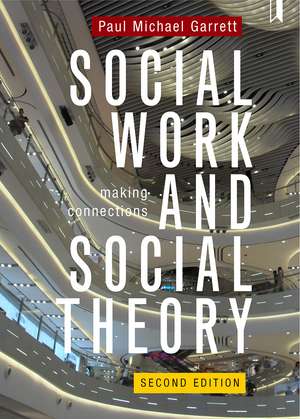Social Work and Social Theory: Making Connections
Autor Paul Michael Garretten Limba Engleză Paperback – 3 iul 2018
The expanded second edition of Social Work and Social Theory aims to radically rework and re-energise the content of the earlier book. Updates to the new edition include: three new chapters (on Foucault, Boltanski and Chiapello, and Negri); a radical editing of the earlier text; updated and topical ‘Reflection and Talk Boxes’ reflecting the major global events reshaping the political landscape in the United Kingdom (Brexit) and United States (the 2016 presidential election); streamlined use of quotations from original sources (e.g. Gramsci, Bourdieu etc.) to aid readability and make complex theoretical concepts even more accessible; a more extensive conclusion; a more contemporary range of references to supersede those which may have become dated since the first edition.
| Toate formatele și edițiile | Preț | Express |
|---|---|---|
| Paperback (1) | 230.52 lei 22-36 zile | +43.84 lei 6-12 zile |
| Bristol University Press – 3 iul 2018 | 230.52 lei 22-36 zile | +43.84 lei 6-12 zile |
| Hardback (1) | 517.57 lei 38-44 zile | |
| Bristol University Press – 9 ian 2013 | 517.57 lei 38-44 zile |
Preț: 230.52 lei
Nou
Puncte Express: 346
Preț estimativ în valută:
44.11€ • 46.18$ • 36.50£
44.11€ • 46.18$ • 36.50£
Carte disponibilă
Livrare economică 17-31 martie
Livrare express 01-07 martie pentru 53.83 lei
Preluare comenzi: 021 569.72.76
Specificații
ISBN-13: 9781447341888
ISBN-10: 1447341880
Pagini: 276
Dimensiuni: 171 x 241 x 18 mm
Greutate: 1 kg
Ediția:Second Edition
Editura: Bristol University Press
Colecția Policy Press
ISBN-10: 1447341880
Pagini: 276
Dimensiuni: 171 x 241 x 18 mm
Greutate: 1 kg
Ediția:Second Edition
Editura: Bristol University Press
Colecția Policy Press
Notă biografică
Paul Michael Garrett is senior lecturer at the National University of Ireland in Galway.
Recenzii
“Paul Michael Garrett is one of the most respected and prolific social work scholars writing on neoliberalism, the welfare state and social work… Social work scholars who recognize the importance of critical social theory and want to engage their students in ‘bigger picture’ debates should foreground this book in their reading lists as it is an absolutely vital teaching aid prompting debate on an complex array of issues impacting on social work and, more broadly, social policy. Scholarly and passionate, Social Work and Social Theory is an excellent book which will strengthen critical and radical social work thought and nurture stimulating debates in, and beyond, the profession’.”
“Paul Michael Garett’s excellent book has already become a social work classic. His work not only skillfully navigates complex theoretical debates but it also bridges the persistent and pervasive gap between social work theory and practice.”
“The second edition of Garrett’s insightful text provides a solid conceptual foundation for the development of critical social work at a time when it is more necessary than ever.”
“A necessary and important book that explains with passion, wit, and insight the links between social theory and social work practice. It will be invaluable to students and practitioners alike.”
“In this revised and expanded edition, Garrett offers a rich and insightful exploration of essential social theory for social work that will be a vital resource for social work educators and students.”
Cuprins
1. Introduction
Part One: Debating modernity
2. ‘How to be modern’: theorising modernity
3. ‘Solid’ modernity and ‘liquid’ modernity
4. Modernity and capitalism
5. Modernity and the unfinished neoliberal project
Part Two: Theorists
6. Thinking with Gramsci
7. Thinking with Bourdieu
8. Thinking with Habermas
9. Thinking with Honneth and Fraser
10. New directions? Boltanski and Chiapello, Negri and Badiou
11. Conclusion
Part One: Debating modernity
2. ‘How to be modern’: theorising modernity
3. ‘Solid’ modernity and ‘liquid’ modernity
4. Modernity and capitalism
5. Modernity and the unfinished neoliberal project
Part Two: Theorists
6. Thinking with Gramsci
7. Thinking with Bourdieu
8. Thinking with Habermas
9. Thinking with Honneth and Fraser
10. New directions? Boltanski and Chiapello, Negri and Badiou
11. Conclusion
References
Index
